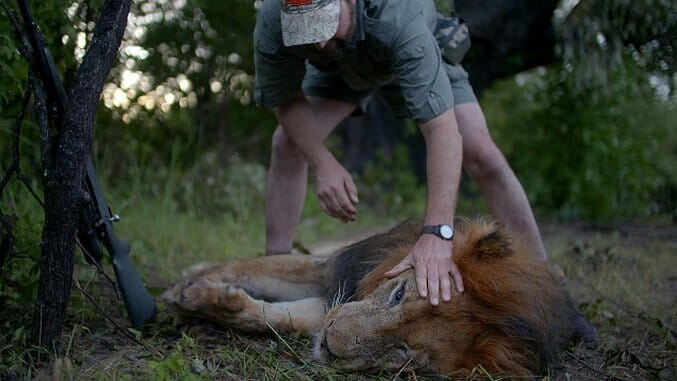Trophy

Shaul Schwarz and Christina Clusiau’s Trophy should find an audience among people with a sensitivity to animal suffering, but there’s a decent chance it won’t. Their documentary, an intimate, breathtaking examination of the overlap between conservation efforts and the big game hunting industry from Namibia to South Africa, is too unflinching and honest, too willing to put that suffering at its forefront as a necessary gesture for driving home its points about the unexpected ways its two focal points intersect.
Schwarz and Clusiau bounce back and forth from hunters, to safari agents, to conservationists, to ecologists, letting each tell their story of Africa’s relationship to animals, and to the art of the hunt. The film ultimately ties its threads into one innately messy but startlingly cohesive tangle, making the case not for any one of its arguments (whether in favor of hunting or conservation or both), but for nuance in a conversation that tends to trigger most of us. If the thought of seeing rhinos doped up on tranquilizer darts having their horns sawed off is upsetting, or if the idea of animals living out their days in cages, waiting for hunters to select them as prey, gives you nightmares, then you’re the type of person for which Trophy was made, but you’re also the type of person who will find the film unendurable.
Schwarz, director of the great Narco Cultura, is a master documentarian, a filmmaker who layers the form’s academic pursuits with top notch craftsmanship. His work is consistently well-made, and oftentimes beautiful, as in Trophy, where the ugliness of his and Clusiau’s subjects are offset by frequent gorgeous overhead shots of African landscapes. That’s a perfect metaphor for nature, of course: a blend of the sublime, awesome power of the wild and the brutish, violent mechanics of survival, of life itself.
That little lump of sugar doesn’t make the grimmer elements of Trophy go down any easier, of course, but take comfort in the fact that Schwarz, at least, isn’t out merely to provoke viewers. (Exception: Viewers who were more outraged by the death of Cecil the lion than by, say, the death of Michael Brown.) Rather, he’s out to educate. To accomplish that goal, he’s done an enormous amount of research, and invested astronomicals amount of time, in tying together the threads of paradoxy that bind hunters to conservationists, ecologists to breeders, in the unifying web of life. It’s the only way to paint an equitable picture of the ethical and financial logistics of killing for sport, for profit, and also for the good of preservation. The discourse is riddled with contradictions, but Schwarz’s movie is free of such internalized drama. It’s a calculated and logical film about an altogether illogical subject.
-

-

-

-

-

-

-

-

-

-

-

-

-

-

-

-

-

-

-

-

-

-

-

-

-

-

-

-

-

-

-

-

-

-

-

-

-

-

-

-








































